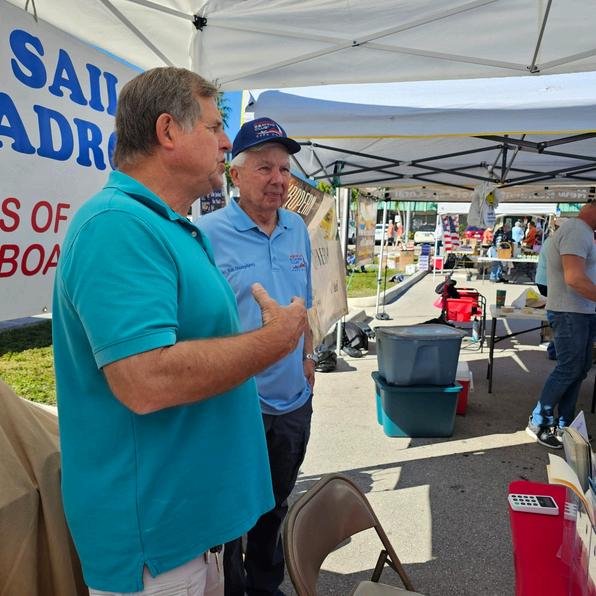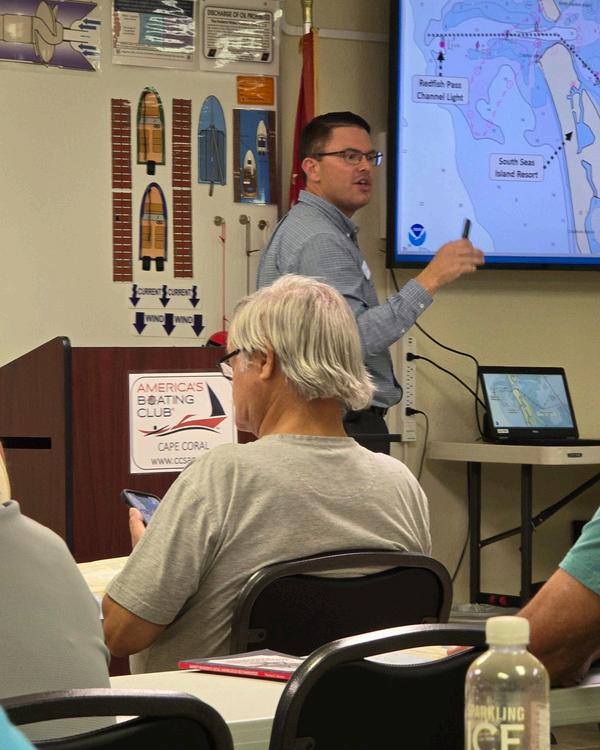
7 minute read
ALL BOATING IS LOCAL
by theensign
Reaching Today's Boaters With Seminars They Want
BY THOMAS E. DAWSON
For years, basic boating education has been a core mission of America’s Boating Club | United States Power Squadrons. However, America’s Boating Course attendance has fallen: less than 4,000 students attended America’s Boating Course in person in the last reported education year. Furthermore, less than 50% of squadrons accounted for all the students.
The only certainty in life, besides death and taxes, is change The internet and social media have had a larger-than=expected impact on the way we communicate and learn. Keeping up with these changes is difficult within an organization steeped in tradition such as ours.
Assistant National Secretary Allan Bombard recently shared a quote from Gen. Eric Shinseki, a retired U.S. Army four-star general and former U.S. Secretary of Veterans Affairs: “If you dislike change, you’re going to dislike irrelevance even more.”
This summed up how I was beginning to feel irrelevant when attendance to America’s Boating Club Cape Coral’s America’s Boating Course started to drop. This led me to ask why and what we could do to turn this trend around.

Looking inward
It turned out we didn’t have to look too hard, as two squadron members, Jim and Joette Humphrey, who were running our booth at the weekly farmers market, had answers.

Cape Coral, Florida, is in the heart of snowbird country, and during snowbird season, November to April, our squadron staffs a booth at the popular Saturday morning farmers market in town. There, our members talk up our club and the classes and seminars we offer. The Humphreys candidly told us we are not providing what snowbirds and area newcomers who stop by the booth want to learn, namely why our local waterways are so challenging. Our volunteers were also hearing that many people don’t want to attend a multi-day boating safety class but still want to learn enough to get out on our waters safely.
Many people were asking things those of us who live here tend to take for granted. Their questions included: What are these “skinny” waters people talk about? Do we really need to stay in the marked channels? How can we get to this or that waterfront place? Where is a good place to fish or beach my boat? Why is the last 2-mile stretch of the river a slow zone? And, gee whiz, why are the waters so crowded?
Most answers are simple and start with understanding our environment. Yet others require knowing boating basics these people didn’t need to know back home like how to read navigation aids and knowing the navigation rules. It became clear that the squadron was missing a prime target for new members snowbirds and area newcomers. We needed to offer a seminar on local waters that we could sell as an introduction to area boating and use to convince new residents they needed a safe boating course.
With information in hand, we met with the squadron leadership to propose a local waters seminar. The traditionalists were resistant to change and fought the idea. They said a two-hour seminar wasn’t enough to teach boaters everything they need to know. We agreed; no one becomes a prudent mariner overnight It takes years to really learn any waterway, and the goal of our proposal was to help new residents get off on the right foot.

Launching the seminar
In January 2024, we piloted the seminar, which is simple in structure and based on the premise that all boating is local America’s Boating Course is all about boating basics. Our local waters seminar is about the local aspects of being out on our waters. These two aspects intersect throughout the presentation. Our seminar briefly discusses critical basic boating safety, and we use those points to market other seminars and classes that cover this topic in detail. If we don’t offer a course or seminar locally, we discuss other resources, including America’s Boating Channel, America’s Boating Club online courses and other third-party sources of boating information.
The seminar is divided into three parts The first section is called, “Toto, I’ve a Feeling We’re Not in Kansas Anymore!” We chose this theme as many new boaters come from inland lakes or eastern coastal waters where you can pretty much point your boat in a direction and go In this section we teach local history so students understand why they can even boat here. This leads to stressing the need to learn how to read a chart, followed by why it’s so important to know the rules and how to read the signs. We toss in other critical bits on tides, currents and local weather.
In the second part, “Let’s Go Boating!”, we dive into getting around safely. We start by explaining why taking shortcuts could be a costly mistake and why following another boat is a bad idea. (Hint: The other boater may know less about the local waters than you do.)
In the final section, “But Wait, There’s More!”, we wrap up with a pitch for joining our club and our member-run groups and taking our other classes.


Reflecting on the results
Offered eight times between January 2024 and February 2025, our local waters seminar has attracted 290 attendees. Many attendees were new members and students from our America’s Boating Course. The seminar costs $15 per person; with squadron ship’s store sales, charts and books, we take in between $1,200 and $1,500 a session.
Building on our success, I wrote a companion book that we sell after the session, at the farmers market and on Amazon. The book, “Barret Bonden's Local Knowledge Recommended: Cape Coral, Caloosahatchee River, Pine Island Sound, Matlacha Pass, San Carlos Bay, Estero Bay,” goes into more detail on the topics and reinforces what students just heard.
And we are not sitting still; after each seminar, we look at what worked and what didn’t to tweak the presentation. The latest addition to the seminar is a short video the squadron created using Google Earth Studio. It allows us to show what boaters face in an area known as the “Miserable Mile.”
So, what’s holding you up? Growing each of our squadrons is key to the ongoing viability of our organization National can’t create local content, but much of what they do create can be adapted to meet the needs of your local boaters
Remember, all boating is local, and our mission is to help new boaters enjoy the water safely.
ABOUT THE AUTHOR
Thomas E. Dawson joined Cape Coral Sail & Power Squadron/22 in 2017 when he was recruited by his brother, Ted Dawson, to help teach America’s Boating Course. Along with Bill Harris, the two brothers received a Polaris Award in 2025 for their excellence in team teaching While working with the squadron’s Cooperative Charting group, Dawson documented over 80 marked channels and almost 1,200 aids to navigation that the group could check. During Covid lockdown, Dawson used this material to author “Safe Boating in Southwest Florida, Cape Coral Edition.” After creating the local waters seminar, Dawson took the material and expanded it into a companion book, “Barret Bonden’s Local Knowledge Recommended.” Proceeds from the sales of these books support the squadron’s education programs.








